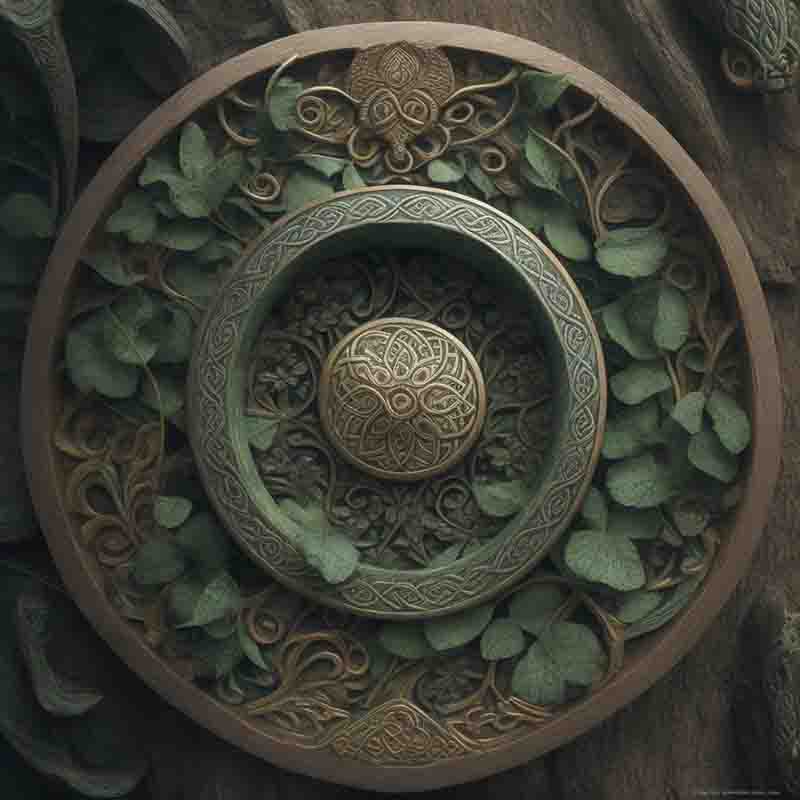Celtic Influence in Brittany
Brittany's Celtic roots traces its origins back to a time when waves of Celts migrated across Europe, settling in various regions and leaving indelible marks on local cultures. In the case of Brittany, the Celtic influence runs particularly deep, shaping its history, language, and identity in profound ways.

Brittany's Celtic roots are profoundly intertwined with its historical origins, forming the very foundation of its cultural identity.
Brittany's Celtic historical origins
Brittany's Celtic roots are not just a remote reminiscence, but a living, breathing aspect of daily life.
Amidst rolling green landscapes, charming coastal towns and a thriving cultural scene, visitors and vacationers to Brittany are likely to discover a unique heritage deeply rooted in Celtic culture.
In Brittany, the seeds of Celtic influence were sown over two thousand years ago, as Celtic tribes, including the Veneti and Osismii, established their presence in the region.
These early Celts brought with them a unique way of life, characterized by a deep connection to the land, a distinct language, and intricate artistry.
As they settled along the rugged Atlantic coast, Brittany emerged as a vibrant Celtic stronghold, with traditions that would shape its identity for centuries to come.
With its rugged coastlines, enchanting megalithic sites, and vibrant traditions, Brittany serves as a living testament to the enduring legacy of its Celtic roots.
At the heart of Brittany's Celtic heritage lies its language, Breton. Closely related to Welsh and Cornish, Breton has played an instrumental role in preserving the region's Celtic identity.
Despite historical challenges and linguistic shifts, Breton language revival efforts persist to this day, with schools, immersion programs, and cultural initiatives dedicated to keeping the language alive.
Celtic culture comes alive in Brittany through its music and dance, where festivals like Fest Noz, the night festivals, serve as a vibrant showcase of tradition.
Brittany's Celtic heritage extends to its art and craftsmanship, where intricate Celtic knotwork, spiral patterns, and motifs inspired by the region's natural beauty adorn everything from jewelry to pottery.
Brittany's coastal towns reveal themselves as not just picturesque landscapes but also as historic Celtic outposts.
Fortifications, megalithic sites, and the omnipresent sea provide glimpses into Brittany's seafaring past and its strategic role in Celtic history.
These towns are living testaments to Brittany's enduring connection to the sea and its Celtic roots.
Celtic spirituality finds its home in Brittany, where a deep connection to nature permeates the very essence of the culture.
Importance of the Breton Language in Preserving Celtic Heritage

Brittany's Celtic heritage is not just a distant memory but a living, breathing aspect of daily life.
The Breton language stands as the cornerstone of Brittany's Celtic heritage, playing a pivotal role in the preservation and continuation of the region's rich cultural legacy.
The Breton language is a living link to Brittany's Celtic past. Its close relationship to Welsh and Cornish is evidence of the shared Celtic heritage among these regions.
This linguistic connection dates back to the migrations of Celtic tribes into what is now modern-day Brittany.
Its importance goes beyond mere communication: it is a guardian of the past, a beacon of cultural identity and a testimony to the unbroken spirit of Brittany's Celtic roots.
The Breton language, with its ancient Celtic roots, carries within it the stories, traditions, and wisdom of generations past.
It serves as a living connection to Brittany's Celtic ancestors, preserving their voices and experiences through the ages.
Speaking Breton is not merely a linguistic choice but a declaration of cultural identity.
It distinguishes the Bretons as preservers of a unique heritage within the diverse landscape of France.
Despite facing challenges and periods of decline, the Breton language has exhibited remarkable resilience.
Efforts to revive and promote its usage have gained momentum, ensuring that it remains a vibrant part of contemporary Brittany.
Brittany's Celtic Music and Dance
One of the most captivating aspects of Brittany's Celtic heritage is its vibrant music and dance traditions.
Rooted in centuries of history, these artistic expressions are not only a form of entertainment but also a powerful way to connect with the region's Celtic roots and showcase its unique cultural identity.
Celtic Art and Craftsmanship in Brittany
The Celtic heritage of Brittany is not limited to language and music, but also finds expression in the arts and crafts.
Celtic motifs and designs are prevalent in Breton art and craftsmanship, including pottery, textiles, and woodwork.
These artistic expressions reflect the region's Celtic identity and are appreciated both locally and beyond.
Celtic knotwork, spirals, interlace patterns, and zoomorphic designs have been integral to Breton art for centuries.
Breton crosses, characterized by their unique shapes and Celtic motifs, are often featured in jewelry.
Given Brittany's maritime history, sea-related themes like waves, fish, and ships are characteristic of the art of Brittany.
Breton Celtic Cuisine
Cuisine is an essential part of any culture, and Brittany is no different.
The region's Celtic heritage is reflected in its culinary traditions, which feature a rich array of flavors and dishes deeply rooted in history.
Breton cuisine features Celtic elements, such as the use of locally sourced ingredients and a focus on seafood.
Dishes like crepes, galettes, and kig ha farz are not only culinary delights but also cultural symbols of Brittany's Celtic heritage
Brittany's Coastal Towns and Celtic History
Brittany's picturesque coastal towns and landscapes not only offer breathtaking natural beauty but also hold a deep connection to the region's Celtic history.
These coastal regions are more than just scenic destinations; they are living testaments to Brittany's enduring Celtic identity.
Brittany's coastal towns serve as historic Celtic outposts, preserving the region's ancient Celtic heritage and acting as gateways to the Celtic past.
Celtic Spirituality
Celtic spirituality and traditions have left an indelible mark on Brittany, influencing its belief systems, rituals, and cultural practices.
The veneration of local saints, holy wells, and sacred groves blends Celtic and Christian traditions.
These cultural practices, rituals, and customs not only showcase Brittany's enduring Celtic influence but also serve as a testament to the resilience of its cultural identity.
Celtic spirituality, including the Celtic spirituality of Brittany, places a profound emphasis on the deep connection to nature.
It celebrates the interdependence between humans and the natural world, recognizing the importance of landscapes, animals, and celestial bodies.
Celtic Festivals and Celebrations
Brittany hosts numerous Celtic festivals and celebrations, including the Festival Interceltique de Lorient.
These events bring together artists, musicians, and enthusiasts from Brittany and other Celtic regions, fostering cultural exchange and collaboration.
Events like the Fest Noz (night festival) and religious processions showcase the region's Celtic roots through music, dance, and religious practices.
Celtic influences in the architecture of Breton buildings
Celtic influences are prominently visible in the architecture of Breton buildings, including churches, chapels, and fortifications.
These architectural elements reflect the region's historical ties to Celtic culture and its unique blend of Celtic and Christian traditions.
Brittany's maritime heritage and its roots in Celtic seafaring traditions
Brittany's maritime heritage is deeply rooted in Celtic seafaring traditions, making it a region with a rich nautical history.
The Celtic settlers who arrived in Brittany centuries ago brought with them a strong connection to the sea, and this maritime heritage has continued to shape the culture and identity of the region.
Pagan roots of Celtic spirituality in Brittany
The pagan roots of Celtic spirituality in Brittany offer a fascinating glimpse into the ancient belief systems and practices that predate the spread of Christianity in the region.
These pagan traditions are deeply intertwined with Brittany's Celtic heritage, reflecting the spiritual connection between the people and the natural world.
Timeline of Brittany and its Celtic heritage, from its origins to the present day
-
500-400 BCE: Celtic tribes, including the Veneti and Osismii, settle in the region now known as Brittany.
-
3rd Century BCE: Celtic culture thrives in Brittany, characterized by distinct art, language, and traditions.
-
56 BCE: Julius Caesar's Roman forces conquer parts of Gaul, including Brittany.
-
4th Century CE: Roman influence wanes, and Brittany becomes a refuge for Celtic culture.
-
5th-6th Century: Celtic Christianity spreads through missionaries like Saint Patrick, and monastic centers are established in Brittany.
-
9th-10th Century: Viking raids lead to the fragmentation of Brittany into smaller kingdoms.
-
11th-12th Century: The Breton language evolves from Old Breton to Middle Breton.
-
12th Century: Brittany becomes associated with the Arthurian legends, with tales of King Arthur and the Knights of the Round Table.
-
1491: The marriage of Anne of Brittany to Charles VIII of France unites Brittany with the Kingdom of France.
-
1532: The Edict of Union incorporates Brittany into the French kingdom.
-
19th Century: Celtic revival movements promote the preservation of Breton language, folklore, and cultural heritage.
-
1950s-60s: A resurgence of interest in Breton culture leads to language revitalization efforts and cultural festivals.
-
1970s-80s: Breton language schools and immersion programs gain momentum.
-
2004: The European Charter for Regional or Minority Languages recognizes Breton as a regional language in France.
-
Present Day: Brittany continues to celebrate its Celtic heritage through festivals, language initiatives, and cultural preservation.
This timeline highlights the enduring Celtic heritage of Brittany, from its early Celtic roots to the modern-day efforts to preserve and promote its unique culture and traditions.
Today, this rich Celtic legacy continues to thrive, reminding the world that Brittany is a living testament to the enduring spirit of the Celts.
Brittany's Celtic Roots: FAQ
Are you curious about music, art, technology, fashion, humanity, lifestyle, and beer?
If so, then you need to subscribe to the free Likewolf newsletter.
100% privacy. When you sign up, we'll keep you posted.
Your Celtic Adventure Continues
The origins of Celtic art go back to ancient times
